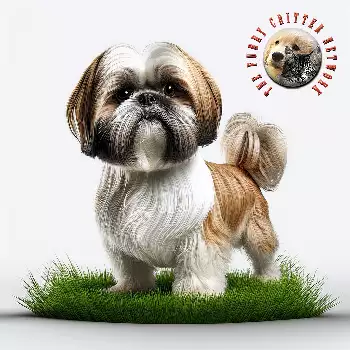American Kennel Club (AKC)
The AKC standard describes the Lion Dog (Shih Tzu) as a compact, solid, carrying good weight and substance. The breed should be rectangular in proportion, slightly longer than tall with a distinctly arrogant carriage. Head should be round, broad, wide between eyes, its size in balance with the overall size of dog. Eyes are large, round, not prominent, placed well apart, looking straight ahead. Very dark in color, lighter on liver pigmented dogs and blue pigmented dogs. Expression is warm, sweet, wide-eyed, friendly and trusting. The double coat is dense, long and flowing. Hard or curly coat is undesirable. A slight wave is permissible. Hair on top of head tied up. Size ranges from 9 to 10.5 inches at the withers, with weight of mature dogs between 9 to 16 pounds. Ideally, weight should be 10 to 13 pounds. The dog should be shown in full coat when being judged.
Fédération Cynologique Internationale (FCI)
The FCI standard emphasizes the Lion Dog (Shih Tzu) as a sturdy, abundantly coated dog with a distinctly arrogant bearing and a chrysanthemum-like face. The general appearance should be that of an active, lively, alert and well-balanced dog. The head should be broad and round, wide between the eyes. Ample beard and whiskers; hair on nose bridge growing upwards gives a distinctly chrysanthemum-like effect. Eyes are large, dark, round, placed well apart but not prominent, with warm expression. Coat is long and dense, not curly, with good undercoat. Slight waviness is permitted. Strongly recommended that hair on head be tied up. All colors are permitted, white blaze on forehead and white tip to tail highly desirable in parti-colors. Height at withers should not exceed 27 cm and type and breed characteristics are of the utmost importance and on no account to be sacrificed to size alone.
United Kennel Club (UKC)
The UKC standard describes the Lion Dog (Shih Tzu) as a small, sturdy dog developed solely to be a companion. The breed is alert, confident, playful and courageous. The head is large and round with a short, square muzzle. Eyes are large, round, dark and set well apart. The expression should be warm and friendly. Ears are large, set slightly below the crown of the skull, and heavily coated. The double coat is long, flowing, and dense. The coat may be slightly wavy but never curly. All colors are acceptable with white markings on the forehead and tail tip being highly desirable in part-colored dogs. Dogs measure from 8 to 11 inches and bitches from 8 to 11 inches. Weight ranges from 9 to 16 pounds. The UKC emphasizes that this breed was developed as a companion and should be friendly, trusting, and affectionate to all. Aggression toward people or other animals is not typical of this breed.
Other Organizations
The Kennel Club (UK) maintains standards similar to the FCI with emphasis on the breed's companion nature and distinctive coat. The Canadian Kennel Club follows standards closely aligned with the AKC version but with metric measurements. The Australian National Kennel Council emphasizes the breed's suitability for apartment living and adaptability to various climates. Most breed-specific organizations worldwide stress the importance of the characteristic flowing coat, round eyes with warm expression, and the distinctive "chrysanthemum" facial hair pattern. Common elements across all standards include the emphasis on temperament as a primary breed characteristic, the importance of proper coat texture and length, and the breed's role as a companion animal rather than a working dog. Regional variations typically focus on size parameters and grooming presentation requirements, with some organizations being more specific about acceptable color combinations and markings.

